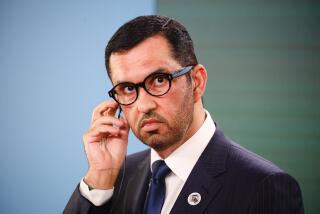A Dust-Up in Basra’s Leadership Vacuum
- Share via
BASRA, Iraq — A week ago, British military leaders chose a Shiite religious leader to help steer the future of this southern city of 1.5 million, describing Sheik Muzahim Tammimi as a respected and unifying figure.
But the selection sparked demonstrations and rock-throwing outside his house. Residents decried his links to Saddam Hussein’s regime, and some complained that a sheik would prove divisive in a country fraught with ethnic and religious divisions.
This week, the British quietly nudged Tammimi aside in favor of the city’s wealthiest businessman, Ghalib Kubba, who was named to head an interim council advising the British commander. Yet some residents immediately criticized Kubba -- saying that he was also too close to the Hussein regime.
The appointments and reactions underscore the delicate task confronting British and American military officials as they attempt to handpick civilian leaders in a complex and distant tribal land. They are struggling to find people who can help rebuild the nation yet maintain some distance from the regime that controlled it for 35 years.
What is clear, said a Western observer here, is that it had been impossible to do business in Iraq without close links with the regime, and now it is difficult to get the country running again without the expertise of those with such links.
“I don’t think the British are naive,” he said. “I believe they think they can’t run it any other way.”
Exiles returning to Iraq offer a pool of potential leaders relatively untainted by Hussein ties, yet they are seen as outsiders who no longer know the country and its people. They are viewed by some as too close to an “occupation force.”
Mansour Tammimi, an advisor to the sheik, has mocked the inbound expatriates as the “opposition of the five-star hotels.”
The new advisory council headed by Kubba, who is a banker and merchant, will advise Brig. Graham Binns on restoring services and a measure of normality to Basra.
Muzahim Tammimi’s first step was to appoint police officers to try to control looting, but some people were outraged because most of the appointees had held the same jobs under the former regime.
“I think the British decided the sheik was not the best person to gather people together,” the Western observer said.
“He’s not necessarily the right choice as a person to lead the [advisory council] as such,” said Capt. Jo Bowlt, a British military spokeswoman. “He wouldn’t necessarily be the leader for that because he might appoint his friends.”
But she said Tammimi could play a role in grass-roots regional meetings to help select a national interim administration.
One member of the new advisory council, shipping broker Zuhir Kubba, referred to the sheik more bluntly: “There were no results. We want results.”
“People in Basra don’t want sheiks or tribal leaders. They’re educated people. They don’t want sheiks who only represent their own family,” said Kubba, whose relation to Ghalib Kubba was unclear Thursday. “If you take one sheik, the others will get upset. And we need to get things done.”
Like most of Iraq, Basra is paralyzed by political infighting, as local officials squabble over the posts left by the top layer of officials who fled.
Electricity, water and other services have been slow to resume, leading to public dissatisfaction and political pressure on the coalition to restore not only order but normality.
“Everyone is haggling with everyone. Everyone is looking for a position,” said Andres Kruesi, head of a Red Cross delegation. “I think it will take a while for things to fall into place, and so we can expect some level of volatility.
“You need people to go back to work, to figure out who’s paying the salaries, and you need to do it pretty fast. In one way or another, it’s up to the occupying power to guarantee the welfare of the people.”
He said many people in Basra blame the British and U.S. forces for the lack of power and water, because those services stopped when the war reached the city.
Sitting in front of his palatial home in Basra, its towering windows still sandbagged, Ghalib Kubba said he spent more on bribes to Hussein officials than he did on his monthly payroll because he, like everyone else, had lived in terror of the regime.
“We paid 3, 4, 5 million [Iraqi dinars] a month,” said Kubba, referring to the bribes. “I never said no to anyone. Always the Baath Party people would come to us and ask for money to build a special place. We’d pay the money without receipts with pleasure, just to keep safe. All the people who were in trade and commerce did the same.”
He said he was never a member of the party and never met Hussein or any of his relatives.
Kubba promised to distribute food ration cards, a move that might be popular with residents but would be unlikely to win support among development and humanitarian agencies, which warn of the dangers of creating a culture of dependency in Iraq.
News of Kubba’s leading role on the advisory council drew complaints that he is too rich.
Some said Kubba could not be so rich unless he had maintained close ties with the regime.
“He’s a partner of Uday Hussein. It’s well-known,” asserted Abbas Mohammed Musa, 47, a fertilizer merchant. “All commercial people from the first-class in Iraq, all of them are partners of Saddam Hussein. We want somebody who is representative of Iraqi people.”
Laborer Hussein Fasel, 42, also was suspicious: “If he becomes leader, he’ll use it to make more money, and the people don’t like that.”
More to Read
Sign up for Essential California
The most important California stories and recommendations in your inbox every morning.
You may occasionally receive promotional content from the Los Angeles Times.













